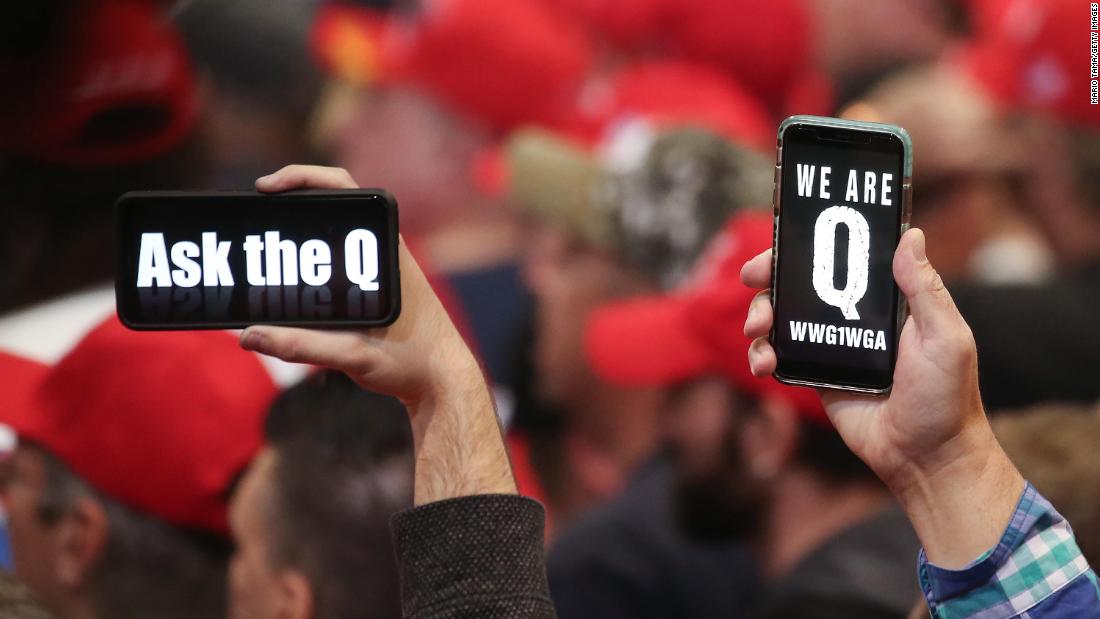Less than 10% of Americans like QAnon

QAnon has been in the news a lot in recent weeks. Polling shows that many people at least partially blame it for the insurrection at the US Capitol on January 6, and it’s a scary and dangerous conspiracy theory.
But we should be clear that it truly is a fringe movement. True QAnon believers are a very small percentage of the population. Republicans should have little electoral fear of speaking out against QAnon in particular, even if certain conspiracy theories (such as falsely believing Donald Trump lost reelection only because of fraud) have been prevalent in some circles.
Last month, the NBC News poll asked voters whether they had positive, negative, neutral or no views of QAnon. A mere 2% held positive views. The rest were either negative (42%), neutral (11%), or weren’t sure or didn’t know (45%).
Keep in mind here that this poll was taken after the US Capitol insurrection, when many blamed QAnon for spreading misinformation that in part led to the event.
The insurrection and other events over the last few months (including Trump’s defeat in the November election) seem in aggregate to have made QAnon even more unpopular than it was. While the percentage who weren’t sure or didn’t know dropped from 56% in September to 45% in January, the positive views of QAnon went from 3% to 2%. Meanwhile, the negative views jumped from 30% to 42%. Neutral is still at 11%.
This isn’t like the false belief that President Joe Biden didn’t win the election fair and square. Polls indicate that about one-third of Americans overall and around three-quarters of Republicans believe that lie.
Now, it is possible that more people believe elements of QAnon even if they don’t like QAnon itself. Additionally, it could be the case that some people are afraid to admit support for QAnon to an actual person.
Last September, the Pew Research Center, using an online panel, asked people whether they had heard of QAnon and whether it was a good or bad thing for the country. This is a somewhat different question from the positive and negative question, but it gets at the same idea.
A mere 9% of people said they had heard of QAnon and thought it was a good thing for the country. Another 35% said they heard of it and it was a bad thing. The rest weren’t sure what it was or refused to answer.
When we break it down by party, we do see that QAnon is somewhat more popular in Republican circles. Even there, though, it’s just 16% who have heard of QAnon and think it’s a good thing for the country. A mere 3% of Democrats have heard of QAnon and think it’s a good thing. More recent online polling has shown a similar percentage of people hold favorable opinions of QAnon.
These numbers for QAnon as a way of thinking are in line with or even lower than some for conspiracy theories that have invaded Republican circles in recent years.
During Barack Obama’s presidency, some argued, falsely, that Obama was a Muslim. (He’s Christian.)
When CNN asked Americans what religion Obama was in 2015, 29% of Americans said he was Muslim. The plurality of Republicans (43%) said he was Muslim.
Another conspiracy theory during the Obama administration that Trump and others adhered to was that Obama wasn’t born in the United States. (Obama was, in fact, born in Hawaii.) This belief was especially dangerous because you can’t be president if you aren’t a natural-born citizen. The theory sought to delegitimize Obama and was pushed by a future president.
Among all Americans, 13% said Obama was born in another country. When undecideds were pushed, 20% of Americans in total said there was solid evidence or suspicion that Obama was born outside the United States. That jumped to 28% with Republicans.
QAnon, however bad, is clearly not as widely believed.
Perhaps it’s best to look at one of the nuttier conspiracy theories of all time to show you just how few people believe in QAnon. Some people believe, falsely, that America faked the moon landing in 1969.
A 2018 CBS News poll found that 10% of Americans think the government faked the moon landing.
Put another way, there are about the same number of people or even fewer who like QAnon as there are people who believe America didn’t put a man on the moon.
The key in the next few months and years ahead is to make sure that as few people believe in QAnon as the polling indicates they do now. Gone unchecked, QAnon, like any conspiracy, could grow. As long as people fight back, QAnon will likely remain a fringe movement.
*** This article has been archived for your research. The original version from CNN can be found here ***


